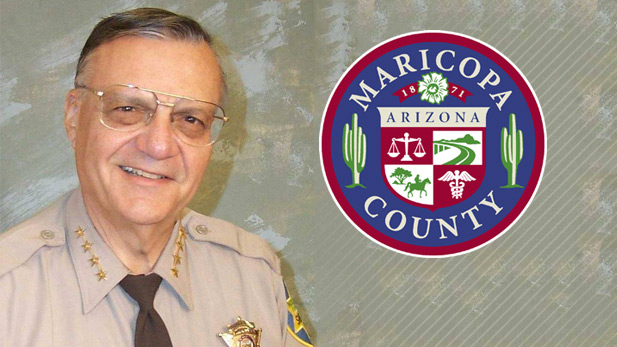 Maricopa County Sheriff Joe Arpaio.
Maricopa County Sheriff Joe Arpaio.
By Jude Joffe-Block, Fronteras Desk
Last week Maricopa County Sheriff Joe Arpaio dropped a bombshell in federal court when he disclosed details of two probes with potential links to presiding Judge Murray Snow.
At the time, Snow was presiding over a contempt of court hearing against Arpaio for violating his orders in a racial profiling case the sheriff lost in 2013.
According to testimony from Arpaio and his chief deputy, the sheriff got a Facebook message in August 2013.
It was from a woman who said she had heard Snow’s wife make comments that the judge hated Arpaio and didn’t want him to be re-elected. According to the sheriff, his lawyer hired a private investigator to talk further with the woman and her family.
That had many wondering if those actions were ethical.
“Yes, it was appropriate; lawyers have to protect their clients,” New York University law professor Stephen Gillers said.
“If this lawyer believed that there was some evidence of personal animus on the part of Judge Snow toward his client, then investigation within certain bounds is entirely appropriate,” said Gillers, who is an expert in judicial ethics.
After all, judges who cannot be impartial in a case are supposed to step aside.
Though at the same time, lawyers do have to be cautious when researching a judge’s potential bias, Gillers said. Going too far could be perceived as intimidation.
“You certainly cannot do anything that is dishonest or misleading, or involves misrepresentation,” Gillers said. “You can’t go through the judge’s garbage to look for evidence of reasons why the judge has to be recused.”
In this case, the sheriff’s lawyers never argued Snow should recuse himself and there’s no evidence the attorney used the intelligence he gathered.
Arpaio and Sheridan identified the lawyer in question as Tim Casey, though Casey would not verify that, citing attorney-client privilege. In a statement on his behalf, his ethics counsel has said Casey was “not involved in any investigation of Judge Snow or his family.”
Another judicial ethics expert, Charles Geyh of the Indiana University Maurer School of Law, agreed it is appropriate for a lawyer to hire a private investigator to verify comments such as those the sheriff received through Facebook.
But there’s also the context that Arpaio in the past helped then-County Attorney Andrew Thomas attempt to bring corruption charges against sitting state court judges and county supervisors.
“If [Arpaio] has a history of investigating his political enemies and this is an extension of that phenomenon, then it seems a whole lot less innocuous," Geyh said. "It seems a little more menacing, it seems more troubling.”
Geyh said at this point in time it is unknown if all the details have come out yet, which he said made it “very hard to tell which of those two scenarios is driving the investigation that took place.”
As for the judge’s wife's alleged comments, Geyh said even if it turned out to be true that Snow said he hated Arpaio, that isn’t proof Snow is not impartial and should recuse himself.
“The reality is that if a judge forms opinions about someone based upon what the judge learns in court, that is to be expected that the judge will form opinions, positive or negative,” Geyh said.
Geyh said usually when there are problems with judicial bias, it is because of pre-existing opinions judges have formed outside of the courtroom.
At the point these comments were allegedly made, Snow had already presided over the racial profiling trial and ruled against the sheriff. Plus, Snow had sanctioned the sheriff’s office for destroying evidence, and had some awareness that sheriff's deputies hadn’t followed one of his orders.
“The idea that the judge would entertain the view that this was not an especially good sheriff, that he shouldn’t be sheriff, and indeed that he doesn’t like the sheriff based on what he has learned, there is nothing about that that strikes me as inappropriate for a good judge to be feeling,” Geyh said. “Now if those feelings are a result of a personal relationship that the judge has with the sheriff, that is different.”
The other investigation Arpaio and Sheridan confirmed in court involves a confidential informant they hired named Dennis Montgomery.
The Phoenix New Times first reported in June 2014 the sheriff’s office had hired Montgomery to prove collusion between the U.S. Department of Justice and Snow.
Sheridan denied that was the point of the investigation. Instead, he testified, they hired Montgomery to investigate alleged computer tampering, wiretapping, and bank fraud by federal agencies based on data Montgomery had obtained while he was working with the CIA.
Both Arpaio and Sheridan testified Montgomery had not proven to be reliable.
In fact, at the time the sheriff’s office hired Montgomery, he had already been discredited in multiple media reports as a scam artist.
The investigation Montgomery worked on is likely to raise even more complicated legal and ethical issues.

By submitting your comments, you hereby give AZPM the right to post your comments and potentially use them in any other form of media operated by this institution.